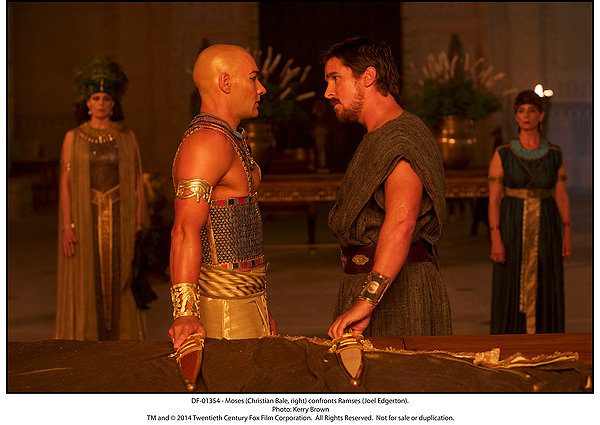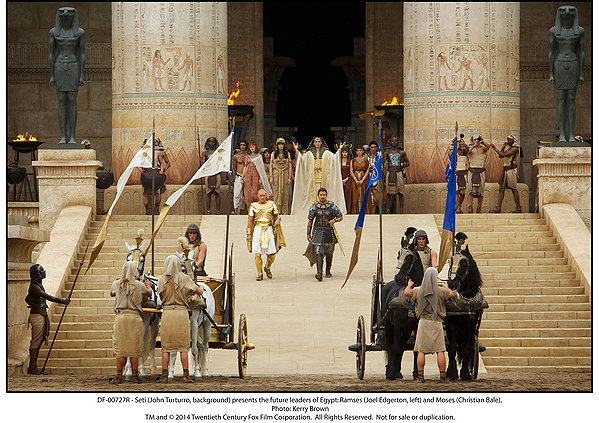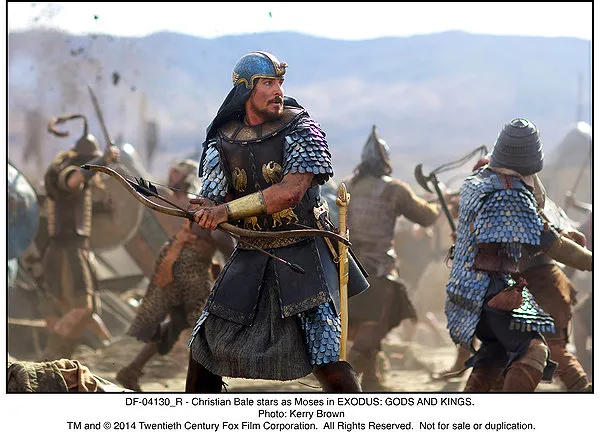When the first trailers for Ridley Scott’s new epic, Exodus: Gods and Kings, hit, the initial reaction (rightfully) was outrage over the film’s whitewashing. Particularly off-putting were the character designs of Australian actor Joel Edgerton, and Americans Sigourney Weaver and John Turturro (seen prominently in the trailer), as the royal family. Add to that an off-putting character design for actor Ben Mendelsohn as the corrupt Governor, who has been outright hidden in the trailer, and the complaints are beyond justified. There was no good reason Scott had to hire white actors for these roles, but in applying a version of black-face is like putting a spotlight on his own mistake. It’s as if he knew he was doing something wrong in casting a nearly all white cast in leading roles, and this was his misguided attempt to remedy the situation and appease audiences. And Scott then dug an even deeper hole for himself, as did Christian Bale, when commenting on the casting decision, stating it was purely for financial purposes and feeding into the very old concept that Hollywood blockbusters can only star white actors; a pure form of professional discrimination.
Not only is the make-up racially insensitive, but it’s also very off-putting and completely inconsistent. For example, Joel Edgerton at times looks like he has been made up to look Middle Eastern, while at other times his fair skin seems just tanned. Likewise, Mendelsohn’s initial appearance features him in make-up far darker than the make-up he wears throughout the rest of the movie. Oddly, Turturro and Weaver retain their fair complexions and only wear heavy eye make-up and wigs. It’s clear that Scott is attempting to recall the actors who played these types of characters in studio-age cinema; but instead of campy Old Hollywood, we’re getting harmful stereotypes.
And this is the problem with the entire film: Scott didn’t fully commit to making a campy movie, so while the villainous Egyptian Pharaoh and his people are all playing it up, the actors playing the Hebrews have been asked to be completely naturalistic and serious. It makes for a completely fragmented film, in which the movie almost reaches the point of “so bad its good” when focusing on the villains; but ultimately ,Exodus: Gods and Kings fails to go far enough with old-fashioned cheese, so it remains a movie so bad it is just bad. So bad, it is one of the worst movies of 2014.
Exodus: Gods and Kings is, if you didn’t already know, a retelling of The Ten Commandments, and it is as much an adaption of the Bible story as it is a remake of the Cecil B. De Mille epic from 1956, which itself was a remake from 1923. Those films, despite their dated, ridiculous flaws, were at the very least made by a director who was passionate about the project on a personal level, which showed in the effort which went into their epics. That care gave their films a sense of perspective and purpose. I don’t know what it was about this story that made Ridley Scott want to make this movie, but he certainly didn’t find a new perspective to justify the time, money, and talent that went into this movie. And boy, is there a lot of talent wasted in this two-and-a-half hour epic.

Joel Edgerton is a really great actor – I loved him in Warrior and Animal Kingdom – but his attempts at “epic” movies haven’t been great. Between his role as Uncle Owen in the Star Wars prequels and last year’s The Great Gatsby, Hollywood really hasn’t figured out how to use Edgerton beyond playing muscular heavies. Sadly, I would say the same thing about the way Hollywood is using fellow Australian Ben Mendelsohn – heartbreaking, considering he gave this year’s best performance in Starred Up (see that, not this). Here, I suspect the only direction Mendelsohn was given was to be a campier, more problematically-effeminate version of the character he played in The Dark Knight Rises (because what this movie needed was an extra dose of homophobia!) There are a few moments when I was reminded of Ben Kingsley’s brilliance in films like Gandhi and Sexy Beast, but then Mendelsohn is jettisoned from the story.
Sigourney Weaver and John Turturro likewise make their all-too-brief appearances in roles which do not merit their effort; especially Weaver, who is slowly becoming a cliche in action films. And while Aaron Paul as Joshua has a lot of screen time, he seems to have about five lines total as he follows and watches Moses with almost no close personal connection to the man. The fact is, all the actors are completely wasted in characters which the writers barely bothered to name. Actors who put in effort are left to completely fend for themselves, and there is no cohesion in terms of performance styles, which is especially problematic when you have actors acting very big right alongside those giving alongside minimalistic performances.
Which leads me to believe that we really can’t blame any of the actors who have to work with this script. It’s like wrestling a grizzly bear; the attempt is ridiculous, ineffective, and ultimately proves fatal. The film was written by four different screenwriters, Oscar winner Steven Zaillian (Schindler’s List) Oscar nominee Jeffrey Caine (The Constant Gardener) and writing partners Adam Cooper and Bill Collage (New York Minute and Tower Heist). I don’t know who originated the script and what others added, but there wasn’t much cohesion in their writing style. However this project came about, this monstrous, expensive epic resists taking a new approach to the material, at times even using the 1956 film as a cheat sheet (I would love to find out what people who don’t know the story think of Exodus).
Even with its flaws, Darren Aronofsky’s other biblical epic this year, Noah, was at the very least a narratively ambitious film. Exodus’s screenplay can’t decide what kind of movie it is, or how to address the question of God. Is this an agnostic approach to a Bible story? A historical fantasy? Or is this a faithful adaption of a religious story? Exodus simply refuses to take any side, which is a large part of the reason it fails to make anything convincing or plausible. The only part of the film they actively seemed to re-imagine is with the casting of child actor Isaac Andrews as a petulant childish version of old testament God… a character who reminds me of Isaac in Children of the Corn. Seems a questionable choice, but at least there was some original thought and reason behind that decision.
Given all these problems with characters, narrative, and script, I would assume most people interested in seeing this film (or any Ridley Scott film) are going to see the visual spectacle and action. Unfortunately, even on that level, this movie fails to deliver, as it has major cinematic issues which are inexcusable for a movie on this level. There are a few visual elements which are pretty cool, like the montage of plagues starting with a bizarre Lake Placid kind of sequence to explain the river of blood. But for a movie with the parting of the sea, Scott really holds back the grandure. Sure, the big wave bringing the water back the sea is cool, but it is also very similar to what we just saw in Interstellar with the mountain of waves. I will say that there is one sequence I think Scott nailed: the moody sequence when Egypt’s first-born children are taken; however, it also doesn’t feel connected to the rest of the film, where Scott shows a considerable lack of restraint. I will also take detour to mention that the baby playing the Son of Edgerton’s Rhames is a really adorable, beautiful child, so whoever cast the kid gets a bonus point.
But for the most part, the movie looks predictable and, often, pretty bad. Scott doesn’t seem comfortable filming in 3D, and it shows. A good rule of thumb for 3D films is to avoid having characters walking into the frame from the foreground, because the first thing the audience sees (and what their eyes will be drawn to) is just the back of a big, prominent head. Scott makes this mistake often. Also, Scott doesn’t frame the film to take into account the number of times there are scenes of people on horseback, so the most dominant part of the screen in 3D is often the head or ear of a horse, which isn’t the most dramatic use of technology. I found myself almost getting a headache during some of the action scenes; and, once again, I have to beg directors: cool it with the shaking camera in 3D movies. It almost never works. And while I understand that J.J. Abrams made lens flairs cool again, lens flairs in period movies do not work the way they can in contemporary or futuristic features, and just read as nothing more than errors to the audience (especially when they are magnified in 3D).
If you’ve seen the movie trailers, you know the film has some technical achievements. The costumes are well made, the sets appropriately epic, and the scope impressively grand. Scott and his usual cinematographer Dariusz Wolski do a great job with those big, sweeping shots of landscapes, and – when they can – of showing a lot of digital people from a distance. But Lord of the Rings did it first and did it better, and there’s nothing new about Scott’s approach, so I’m not overly impressed or absorbed in watching that kind of tech. The movie is so often rather ugly, especially the battle and action scenes, during which it is incredibly difficult to piece together what is happening. The score by Alberto Iglesias is pleasant and operatic, but it is used in a way that ultimately detracts from the narrative and characters, rather than to enhance those elements.
Now, Christian Bale’s performance as Moses. I’ve avoiding talking about it earlier in this review because there is a very big problem with it, both logically and ideologically. Bale is arguably the only true A-list movie star in the film, the actor Scott was talking about needing to get this movie made; and yet Bale is the only actor who seems to be completely phoning in his performance. Bale seems completely detached from the character of Moses, and never has chemistry with the other actors on screen. Even if he had gone a little too big or too intense, that choice would have been better than this lackluster performance. Bale told the press he watched comedies like History of the World Part I and Life of Bryan to prepare for the role, but even that light hearted approach doesn’t show through. For an actor praised for taking his work so seriously that he is willing to endanger his health, Bale showed none of that commitment here.
And ideologically, watching this film about slaves and freeing people, there is something incredibly unsettling about watching three young, white men leading thousands of slaves of color out of Egypt. Bale, Paul, and Andrew Tarbet (as Aaron) literally seem like the white saviors we talk about, and Scott really had every opportunity to do things differently. The problem with the film’s dogma is specifically the whitewashing among the Herbrew people. There is only one gay character in the film, which also happens to the film’s biggest and most ridiculous villain, despite the clearly influential 1956 Ten Commandments being more progressive by suggesting Joshua had a sexual infatuation with Moses. Women barely register as characters, but especially offensive is Moses’s wife Zipporah (Spanish actress Maria Valverde), who is important in the Bible, but here is nothing more than The Girl, the love interest, in this film (the two love scenes are laughable). And with the exception of Ben Kingsley, I don’t remember a single man of any color playing a Hebrew slave being given a line of dialogue, unlike the Egyptians which did cast some different ethnicities in small supporting roles.

So what is the point of Exodus: Gods and Kings? To make money by retelling a familiar story most people know and to which they already have an attachment? Alright, but more specifically, there has to be a grander reason than that to tell this specific story. Was it an attempt to retell the story of Moses as if historically accurate? Or to tell the message of power and freedom that still effects us today? If so, the film fails to do either effectively or with any nuance. I believed at one point the emphasis was on the nature of brotherhood, which would be a logical take on the story of Moses and Ramesses (especially considering Ridley Scott’s dedication to his brother Tony).; but if that were the case, doing nothing more than having Turturro telling us of this brotherhood, before Scott immediately cut their ties, fractures that aspect of the story completely. Bale and Edgerton have none of the chemistry to suggest such a bond of brotherhood in the few scenes they have together, and Bale especially seems completely unaffected by the loss of his brother.
I stand with the public saying they won’t pay to see this movie (I didn’t), but this also isn’t a movie worth the debate behind it. There are so many issues wrong with the film on a technical, structural level, that debating the big issues of this film should be saved for a movie which merits the debate and attention. There is nothing grand or epic here except the waste.
Lesley Coffin is a New York transplant from the midwest. She is the New York-based writer/podcast editor for Filmoria and film contributor at The Interrobang. When not doing that, she’s writing books on classic Hollywood, including Lew Ayres: Hollywood’s Conscientious Objector and her new book Hitchcock’s Stars: Alfred Hitchcock and the Hollywood Studio System.
Are you following The Mary Sue on Twitter, Facebook, Tumblr, Pinterest, & Google +?









Published: Dec 8, 2014 08:00 pm